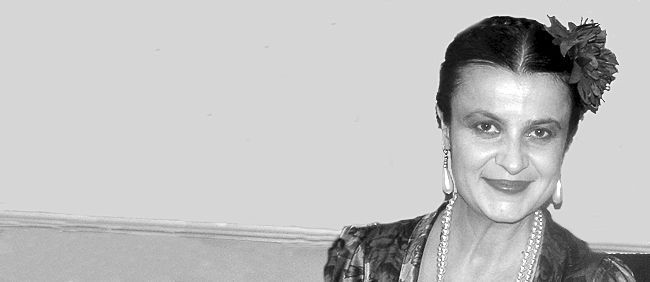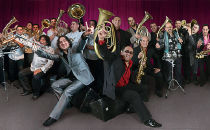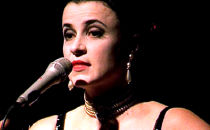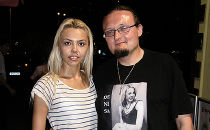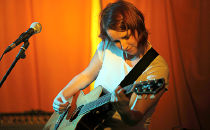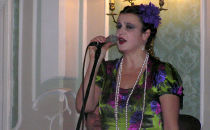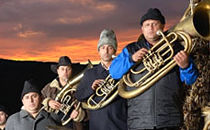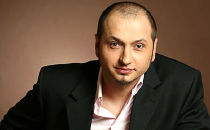Gifted with such an interesting voice, Oana Cătălina Chiţu successfully renders the climate of the urban tangos from "Little Paris" of the pre-war times. The old vinyls helped her to come back to her roots. Her music is a tribute to Maria Tănase.
At the beginning I would to like thank you for the wonderful concerts and great music. Tell me about your first contact with Bucharest Tango?
Thank you for the nice words. My first contact with tango, with the Romanian tango... I can’t remember. Many years ago my father used to sing it while he was drank, so since the early childhood I’ve had contact with this wonderful music. But tango didn’t official exist during Ceausescu’s time. My father’s sister, who lived in Bucharest, had some old vinyls and then for the first time I heard the original versions of Bucharest Tangos. Later, while I was living in Berlin, I got a collection of tangos on CDs and I heard them again.
What were the subjects of these songs? Tell me about lyrics of these songs. In Warsaw’s old urban folklore we have also some pieces based on the sound of the tango. Many of them are sorrow and criminal stories. What about Bucharest?
No, no, in Bucharest tangos stories are about love, life, lies... and about other side of love. This is a bit similar to Argentinian tangos, in their best, old fashioned style. I don’t think that today is possible to say 'I love you' like in the twenties or the thirties, because today we have another way to say 'I love you, you love me'.
During the concert you sang the song called 'Mariza', in original version - 'Zaraza'. This is a very important tango for me, because the Polish version of this tango was sang during Warsaw’s Uprising. Did you know about it?
No, I didn’t... I knew that the word 'Zaraza' in Polish is a bit pejorative, that was why I changed the tittle for my Polish program for 'Mariza'..
My grandfather was a very big fan of tango and Bucharest one too. In Poland before the II World War tango was played in Warsaw too, e.g. we had a band called Henryk Gold Orchestra who performed a big hit called 'What fantastic Romanian girls' based on tango style. So do you agree that Bucharest Tango is a part of urban folklore?
Yes. Exactly, the tango 'Zaraza' is not very Romanian. The composer, Benjamin Tagle Lara was Argentinian. Romanians created another text to this song. In general tango doesn’t have Romanian roots, but a lot of Romanian composers and poets wrote tangos. It was time of opening to the West. Then many kinds of music were played, like jazz, tango and traditional music like Maria Tanase too. Bucharest was very opened to the West, was called 'little Paris' in Europe. Yes, I think that tango belonged to the Romanian culture and it still belongs now.
And what about Gypsies influences in tangos. Is it possible or not...?
Yes, It’s possible, everything is possible in music.
But I would like to ask you about Gypsies influences in traditional Bucharest Tango, do they exist?
I don’t think so... In the twenties and in the thirties in Bucharest there were many gypsy bands which played music called 'lautareasca'. This is wonderful music, we play also some songs from these times and I think that this is a small interaction... but I can’t tell that lautari music had a big influence on Bucharest Tango. These were completely different worlds.
What about contemporary Bucharest Tango style, is this still a living tradition? You play partly with electric bass guitar, saxophone, jazz influences... what about combining Bucharest Tango with other music genres, like rock, jazz or disco too? What do you think about it?
Yes, why not, as I said before, everything is possible. We usually play with acoustic doublebass and I like this kind of music, my project is based on the warm instruments. We don’t use electronics because I think the most beautiful tango is the traditional one. Our arragements are not so modern, we take elements from the traditional music, gypsies songs and we mix it with jazz. This is not like in the twenties, we don’t want to play in the same way as in the twenties. We try to recall the atmosphere of the twenties but with modern music and contemporary influences.
I understand that your music is not a pure reconstruction?
Yes, we have our own arragements, which are different from the ones made by musicians from the twenties and the thirties.
What do you think about Polish audience after your concerts?
They are very, very warm people and they really understood me! I’m sure, because they seemed to be very happy, some faces were smiling all the time... I think they enjoyed a lot. I felt it!
What are your future plans regarding this project?
Well, our project is not very known in the world. I would like to play it everywhere. I have many ideas for the future - I would like to take some old gypsy songs, old romances and old, good Bucharest songs from the twenties and thierties. This is a very important part of the Romanian culture, important for me and still important for many Romanian people too. These are wonderful songs, melodies and lyrics which I want to sing. I want the world to hear it. We have plenty of these songs. And it would be good to recall them. In Romania some artists play tangos in a very modern way, without traditional instruments, but with electronic ones. I don’t like it so much.
And tell me about Maria Tanase, I’m her fan, I like Romanian culture very much and I often listen to her beautiful music... Is she still popular in Romania?
Yes, yes! She is still very popular, everyone in Romania loves her songs! And I think she will stay number one for Romanian people. Many musicians dedicated their songs to Maria Tanase and were inspired by her songs and were trying to play similar music. She is still very famous and popular. We play her songs too, in our arragements. We try to remember about her all the time, I really love her!
My last question will be a bit controversial. I would like to ask you about popular in Romania but controversial style called 'manele'. Is this possible that the new Bucarest Tango, played nowadays, will be an alternative for manele in urban culture?
Ha, ha... So, in fact, manele was a very beloved style in the world of gypsy music and it came to us from Turkey and other countries. There were very good musicians like Gabi Lunca, they sang manele in a very artistic ways - and this kind of music, lautari music I love! Contemporary 'maneaua' is a totally different style, I can’t say I enjoy it because this is not what I expect from the culture. I understand that this music is only for fun and dance, but the lyrics... I’m sorry.
Multumesc frumos pentru interviu, toate cele bune!
Cu mare placere, la fel, numai bine!
